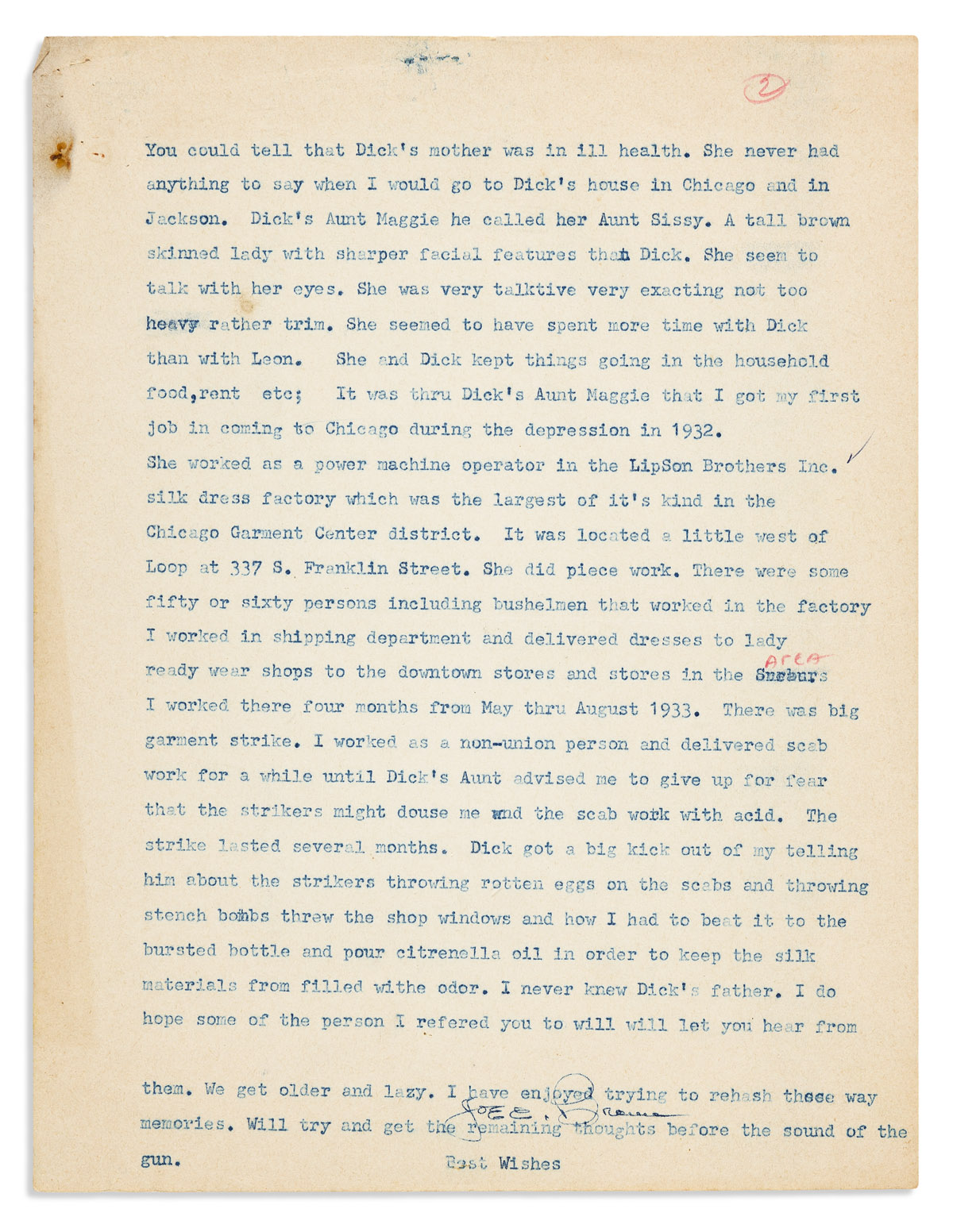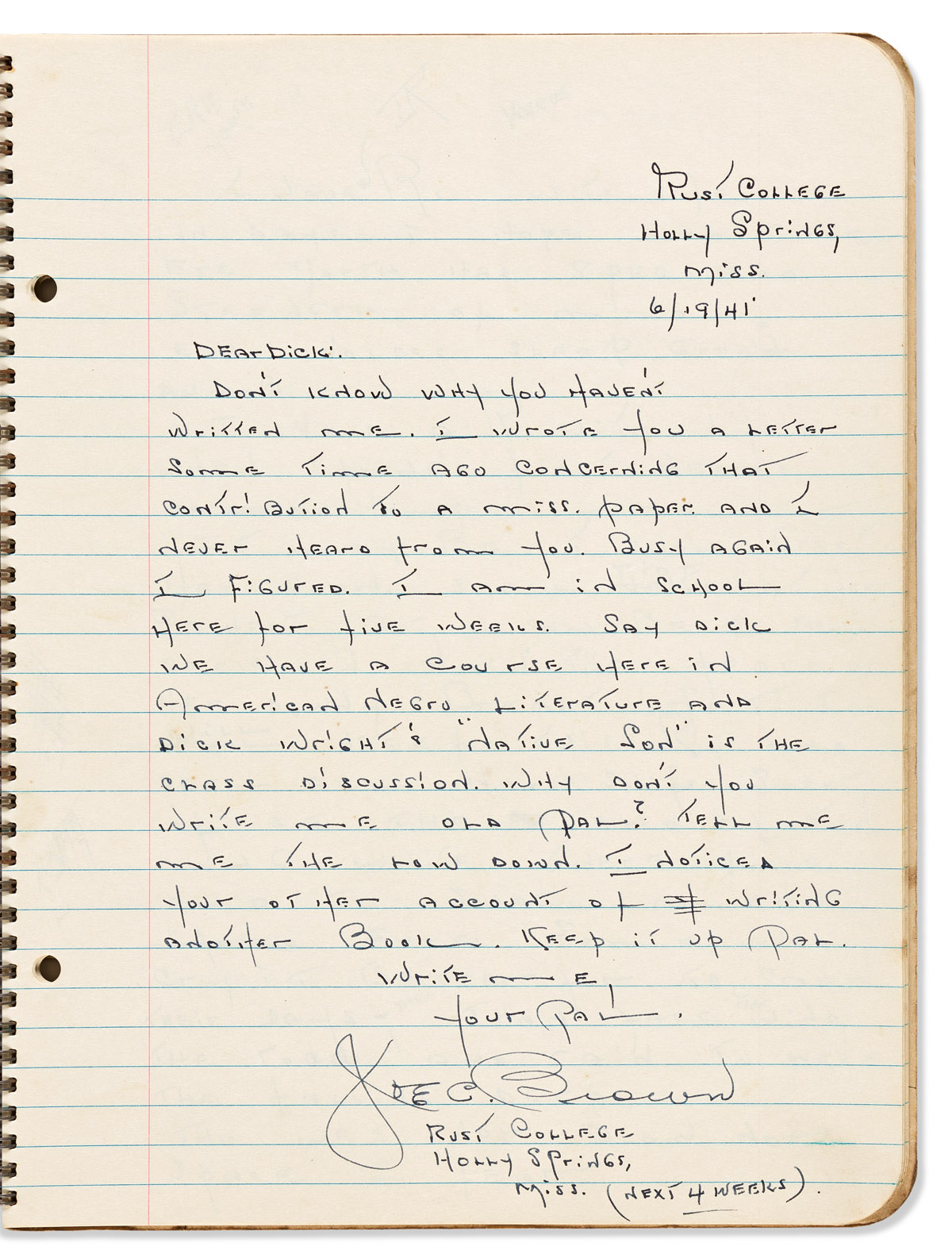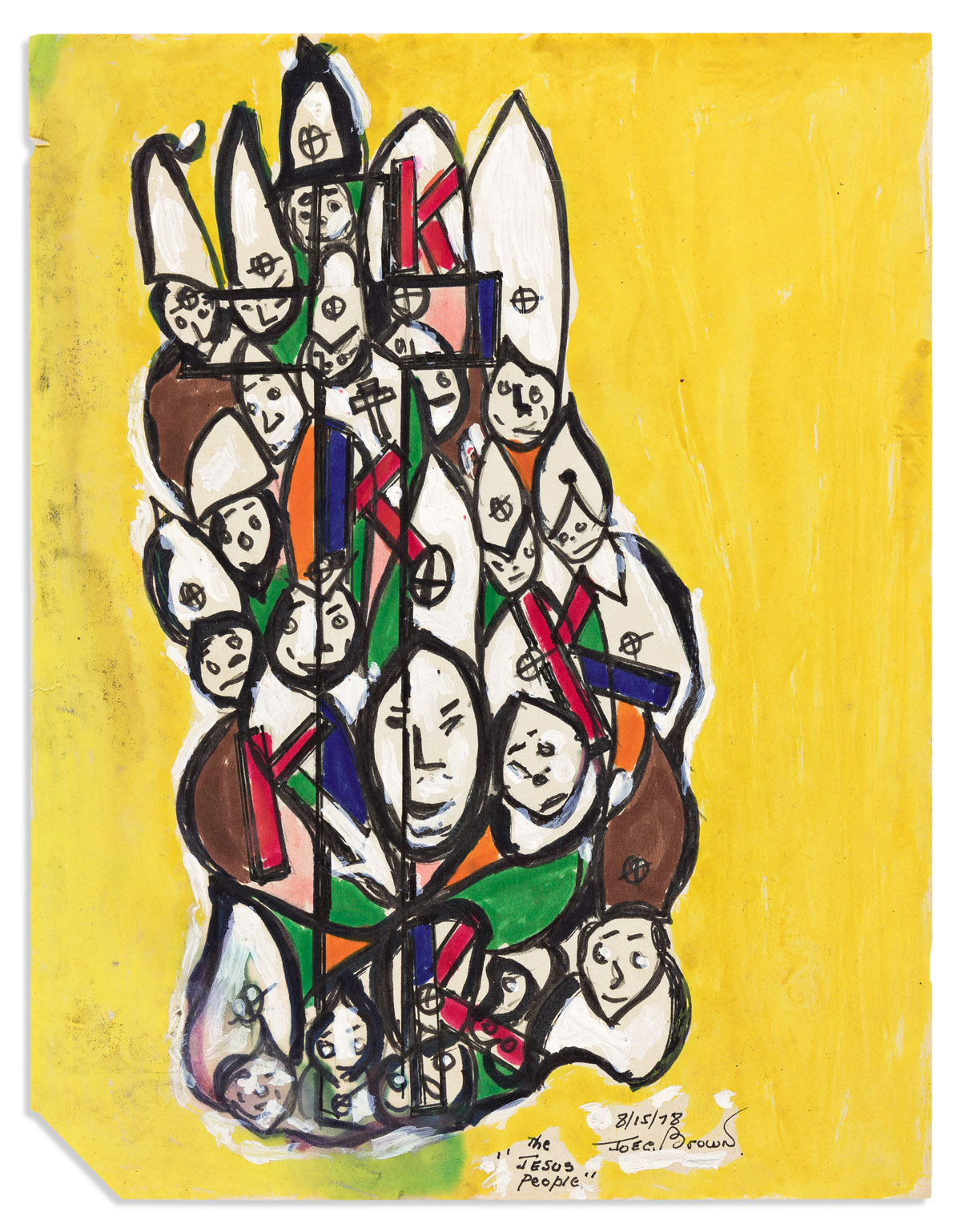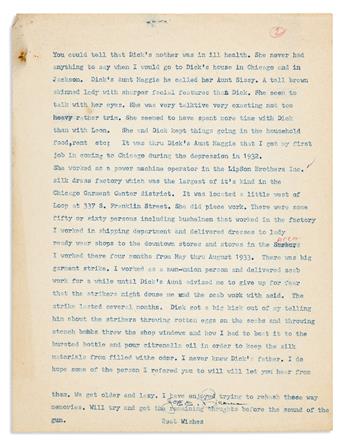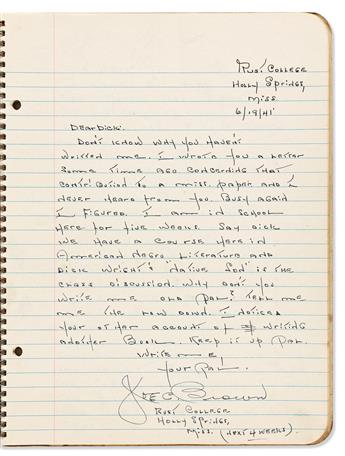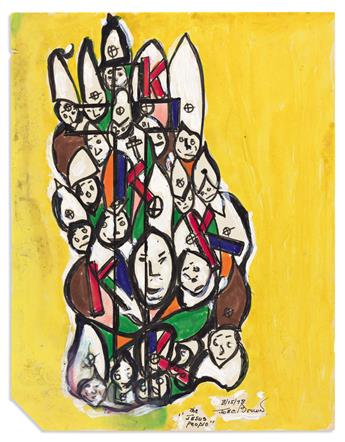Sale 2598 - Lot 306
Price Realized: $ 4,200
Price Realized: $ 5,250
?Final Price Realized includes Buyer’s Premium added to Hammer Price
Estimate: $ 2,000 - $ 3,000
(LITERATURE.) Papers of author Joe C. Brown, a lifelong friend of Richard Wright. Thousands of pages (1.4 linear feet) in two boxes, including manuscripts, correspondence, and original art; condition varies but generally worn. Various places, 1933-1993
Additional Details
Joseph Clifton Brown (1908-1993) was an author, educator, and artist who was usually known as Joe C. Brown. Born and raised in Mississippi, he was an instructor and principal at three Mississippi schools before heading north to Chicago in 1948 with his wife and children. There he did data processing for the Department of Labor, wrote a column for the Chicago World, stayed active in the civil rights movement, and pursued his creative endeavors on the side, retiring in 1976.
Brown is best known to history as a close lifelong friend of the author Richard Wright; he also knew the author William Faulkner, who became a literary mentor. Kent State University Library published Wright's letters to him in 1968 as "Letters to Joe C. Brown." This large and wide-ranging archive does not include Wright's original letters, but it includes much more.
The bulk of this collection consists of drafts and fragments of Brown's poetry, fiction, and essays, including a long series of aphorisms and anecdotes under the title "Homeboy Says." One highlight is a fragment of his memoir of Richard Wright, sharing his memories of "Dick's" mother and Aunt Maggie. A notebook kept at Rust College in 1941 includes a draft of a letter from Brown to Wright dated 19 June 1941: "Say, Dick, we have a course here in American Negro Literature and Dick Wright's Native Son is the class discussion."
Brown's memories of William Faulkner are recorded in 3 drafts of his essay "The Faulkner I Met in the Red Hills." Records on the sale of two letters from Faulkner are also included.
The collection includes little from his Mississippi days, other than several worn leaves from a scrapbook dating from 1933 to 1940, including a typed letter from Claude A. Barnett of the Associated Negro Press recruiting him as a Mississippi correspondent, and other letters relating to his work as a school principal. After moving to Chicago, Brown remained involved in education, including extensive work with a group promoting a Black history curriculum.
Brown's correspondence file contains letters from Wright's biographer Constance Webb, editor Horace Cayton, poet Dudley Randall, Sun Ra trumpeter Philip Cohran, and more.
Brown was not known as an artist, but was a prolific amateur with some talent. This lot includes 65 pieces of his work, some of it worn or dampstained, most of it boldly colored and somewhat abstract, 1975 to 1983 and undated.
Ephemera in the collection includes a worn flier for an "All-Day Vote Caravan" in Chicago featuring Martin Luther King and John Lewis, 29 October 1964; a pamphlet titled "Mississippi's Rural Negro Schools" from 1939; a flier for the Frank London Brown Negro History Club, 18 March 1967; and an Operation Breadbasket program featuring Jesse Jackson, 28 August 1971. Finally, two of his printed poems issued by the Broadside Press of Detroit are included: "Ghetto Manchild" (1966) and "But Not Like Yesterday" (1968). The well-known journalist Horace R. Cayton has inscribed a copy of the latter: "The moving lines of Joe Brown's tribute to Martin Luther King at the time of his death revitalized in me my own feelings of anguish, shock, hope, and a new steeled dedication."
Brown is best known to history as a close lifelong friend of the author Richard Wright; he also knew the author William Faulkner, who became a literary mentor. Kent State University Library published Wright's letters to him in 1968 as "Letters to Joe C. Brown." This large and wide-ranging archive does not include Wright's original letters, but it includes much more.
The bulk of this collection consists of drafts and fragments of Brown's poetry, fiction, and essays, including a long series of aphorisms and anecdotes under the title "Homeboy Says." One highlight is a fragment of his memoir of Richard Wright, sharing his memories of "Dick's" mother and Aunt Maggie. A notebook kept at Rust College in 1941 includes a draft of a letter from Brown to Wright dated 19 June 1941: "Say, Dick, we have a course here in American Negro Literature and Dick Wright's Native Son is the class discussion."
Brown's memories of William Faulkner are recorded in 3 drafts of his essay "The Faulkner I Met in the Red Hills." Records on the sale of two letters from Faulkner are also included.
The collection includes little from his Mississippi days, other than several worn leaves from a scrapbook dating from 1933 to 1940, including a typed letter from Claude A. Barnett of the Associated Negro Press recruiting him as a Mississippi correspondent, and other letters relating to his work as a school principal. After moving to Chicago, Brown remained involved in education, including extensive work with a group promoting a Black history curriculum.
Brown's correspondence file contains letters from Wright's biographer Constance Webb, editor Horace Cayton, poet Dudley Randall, Sun Ra trumpeter Philip Cohran, and more.
Brown was not known as an artist, but was a prolific amateur with some talent. This lot includes 65 pieces of his work, some of it worn or dampstained, most of it boldly colored and somewhat abstract, 1975 to 1983 and undated.
Ephemera in the collection includes a worn flier for an "All-Day Vote Caravan" in Chicago featuring Martin Luther King and John Lewis, 29 October 1964; a pamphlet titled "Mississippi's Rural Negro Schools" from 1939; a flier for the Frank London Brown Negro History Club, 18 March 1967; and an Operation Breadbasket program featuring Jesse Jackson, 28 August 1971. Finally, two of his printed poems issued by the Broadside Press of Detroit are included: "Ghetto Manchild" (1966) and "But Not Like Yesterday" (1968). The well-known journalist Horace R. Cayton has inscribed a copy of the latter: "The moving lines of Joe Brown's tribute to Martin Luther King at the time of his death revitalized in me my own feelings of anguish, shock, hope, and a new steeled dedication."
Exhibition Hours
Exhibition Hours
Aliquam vulputate ornare congue. Vestibulum maximus, libero in placerat faucibus, risus nisl molestie massa, ut maximus metus lectus vel lorem.



